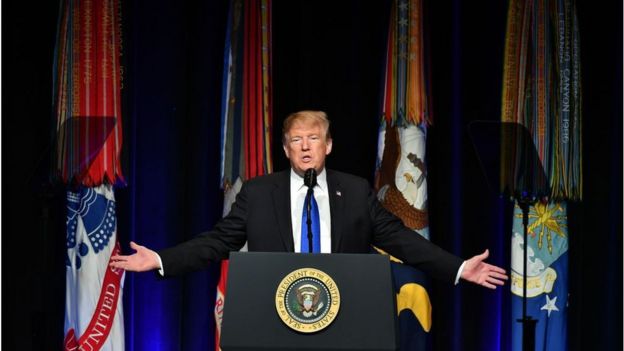
This article is more than
6 year old
It is the first time the US has labelled another nation's military as a terrorist organisation.
The White House said the IRGC was Iran's primary means of "implementing its global terrorist campaign".
Washington-Tehran tensions have risen since Mr Trump withdrew the US from the international Iran nuclear pact.
Numerous IRGC and affiliated entities have previously been subjected to US sanctions in connection with alleged proliferation activities, support for terrorism and human rights abuses.
Mr Trump's statement on Monday said: "This unprecedented step, led by the Department of State, recognises the reality that Iran is not only a State Sponsor of Terrorism, but that the IRGC actively participates in, finances, and promotes terrorism as a tool of statecraft."

The president added that the move was meant to "significantly expand the scope and scale" of pressure on Iran.
"If you are doing business with the IRGC, you will be bankrolling terrorism," Mr Trump said.
The measure will take effect in one week's time, according to US Secretary of State Mike Pompeo.
Mr Pompeo said the US will continue to sanction and pressure Iran to "behave like a normal nation" and urged US allies to take similar action.
"The leaders of Iran are not revolutionaries and people deserve better," Mr Pompeo said. "They are opportunists."
In a later tweet, he added: "We must help the people of Iran get back their freedom."
In an important step to counter the Iranian regime’s terrorism, the U.S. has designated the Islamic Revolutionary Guard Corps, incl. Qods Force, as a Foreign Terrorist Organization. We must help the people of Iran get back their freedom. pic.twitter.com/T65CxJjRrr
— Secretary Pompeo (@SecPompeo) April 8, 2019
Labelling the IRGC as a terrorist organisation will allow the US to impose further sanctions - particularly affecting the business sector, given the IRGC's involvement in Iran's economy.
Mr Pompeo and National Security Adviser John Bolton were reportedly in favour of the move, but some Pentagon officials, including Joint Chiefs of Staff Chairman Gen Joe Dunford, have expressed concerns, the Wall Street Journal reported.
Military officials cautioned that the designation could incite violence against US forces in the Middle East without severely impacting Iran's economy.
The Central Intelligence Agency (CIA) had also reportedly opposed the move.
After reports of the Trump administration plan surfaced last week, Iran had warned it would retaliate in kind.
"We will answer any action taken against this force with a reciprocal action," a statement issued by 255 out of the 290 Iranian MPs said, according to the Islamic Republic's state-run IRNA news agency.
The IRGC was set up shortly after the 1979 Iranian revolution to defend the country's Islamic system, and to provide a counterweight to the regular armed forces.
It has since become a major military, political and economic force in Iran, with close ties to the Supreme Leader, Ayatollah Ali Khamenei, and many other senior figures hailing from its ranks.
The IRGC is estimated to have more than 150,000 active personnel, boasts its own ground forces, navy and air force, and oversees Iran's strategic weapons, including its ballistic missiles.
It also controls the paramilitary Basij Resistance Force, which has helped suppress domestic dissent, and the powerful bonyads, or charitable foundations, which run a considerable part of the economy.
The IRGC exerts influence elsewhere in the Middle East by providing money, weapons, technology, training and advice to allied governments and armed groups through its shadowy overseas operations arm, the Quds (Jerusalem) Force.